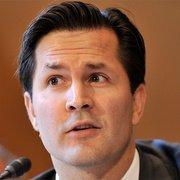Thomas Bollyky, an adjunct professor at the Georgetown University Law Center, spoke at a webinar hosted by the World Health Organization (WHO) on pandemic preparedness and public trust Jan. 25.
Bollyky, who runs the global health program at the Council on Foreign Relations, a nonpartisan think tank, discussed with other panelists the role that public trust plays in coordinating and carrying out pandemic responses. Panelists detailed their findings and opinions on the impact of low trust, both in government and in individual communities.
Bollyky said that trust between a country’s citizens and its government, as well as between members of a community, should be a key theme in discussions of improving pandemic preparedness.
“Many assessments of the U.S. and other nations’ performance in the COVID-19 crisis acknowledge the importance of public trust, but fail to include concrete proposals for addressing its potential absence in future pandemic preparedness and response planning,” Bollyky wrote to The Hoya. “That is what my colleagues and I are working to change.”
Bollyky and several colleagues published findings in The Lancet, a peer-reviewed medical journal, from research they conducted on the relationship between trust-building and success when facing pandemics in February 2022.
During his opening statement at the webinar, Bollyky said the study aimed to analyze the large differences in the number of COVID-19 deaths across countries, in order to inform future responses to global health crises.
“If policymakers want to limit the damage from that next threat, they will need a clearer understanding of why some nations have done better in responding to this one,” Bollyky said on the panel. “What we did find was a significant association between cumulative infections — the total number of infections — and trust in government and interpersonal trust. And the effect we observed was large.”
According to the February 2022 publication, factors that contributed to differences in COVID-19 infections across countries included altitude, GDP per capita and seasonality. Greater trust and less government corruption also resulted in statistically significant lower infection rates, as well as more vaccine coverage in certain countries.

Bollyky said that understanding the roots of these differences is integral if policymakers want to improve the results of government pandemic response in the future.
“While the COVID crisis is certainly not over, the time for planning for the next dangerous pandemic threat has already begun,” Bollyky said at the event. “And if policymakers want to limit the damage from that next threat, they will need a clearer understanding of why some nations have done better in responding to this one.”
Other panelists included Zubaida Haque, former interim CEO of The Runnymede Trust, a race equality think tank; Sylvie Briand, director of the WHO Global Infectious Hazard Preparedness department; Owewale Tomori, former president of the Nigerian Academy of Science, an independent scientific body in Nigeria; Lucille Blumberg, former deputy director of the National Institute for Communicable Diseases, a South African public health organization; and Andy Seale, adviser for the WHO Department of Global HIV.
Haque said individuals from communities that face or have historically faced structural inequalities often turned to friends and family members as sources of information during times of health crisis.
“Especially marginalized communities and overlooked communities historically — because they haven’t had a trustworthy relationship with governments, with the medical establishment, with clinicians, with national health services and so on — they tended to depend on people around them,” Haque said on the panel.
Haque said that public health experts could have predicted the disproportionate impact the pandemic had on groups who face disparities.
“I think I come at this from the perspective that we didn’t need the pandemic and the appalling outcomes, especially in terms of ethnic disparities, hospitalizations and deaths,” Haque said at the event. “We didn’t need those outcomes to know that this pandemic was going to be a pandemic of inequality, and that’s because we’ve always known that those inequalities existed in society.”
Blumberg said trust should be established prior to health emergencies in order to prevent the spread of illness.
“Trust is absolutely critical to ensuring that people respond to what you think is right, to manage them and to stop the outbreak,” Blumberg said. “But I think as previous speakers said, you have to build this trust before the outbreak.”
Bollyky said societies with low levels of trust experience worse health outcomes as trust levels decline globally.
“Reported levels of trust in government and among citizens are declining in many democracies, especially in the United States,” Bollyky wrote. “As mentioned, that decline has had devastating consequences in the COVID-19 pandemic, where low-trust societies performed significantly worse than their counterparts, but it has broader implications for health and societies as well.”
Levels of public trust in the U.S. have steadily decreased in the past several decades, with just 21% of surveyed Americans reporting that they trust the federal government to do what is right “just about always” or “most of the time” in 2022, according to a Pew Research Center study.
Bollyky said that it remains essential that governments facilitate cooperation among their citizens during a pandemic.
“When confronted with a novel, contagious virus, the most effective way for a government to protect its citizens is convincing them to voluntarily take measures to protect themselves and others,” Bollyky wrote. “Especially in democracies, the success of those efforts depends on trust — between citizens and their governments and among citizens themselves.”




















